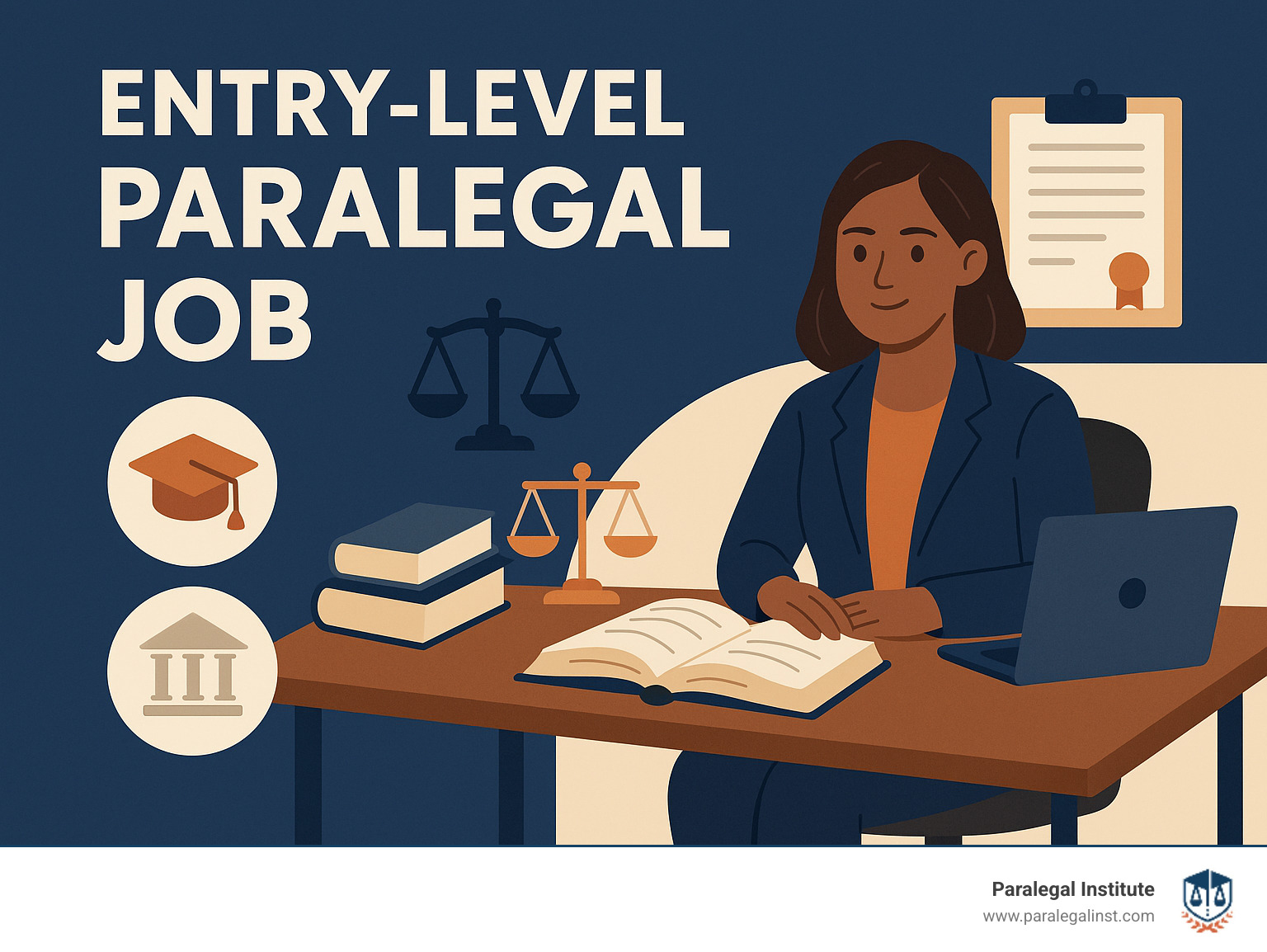Paralegal Positions for Beginners – Your Next Job Awaits!
Breaking into the Legal Field: Entry-Level Paralegal Opportunities
Looking for an entry level paralegal job? Here's what you need to know:
An entry level paralegal job offers a practical gateway into the legal profession without spending years in law school. These positions provide valuable hands-on experience while letting you contribute meaningfully to legal teams from day one. Most beginning paralegals work under attorney supervision handling document preparation, research, and client communication.
For those looking to transition careers or start fresh in the legal field, entry-level paralegal roles provide the perfect balance of accessibility and professional growth potential. The paralegal profession continues to expand as law firms and corporate legal departments seek cost-effective legal support.
I'm Matthew Pfau, and as an attorney who has hired and trained numerous paralegals throughout my career, I've seen how valuable entry-level paralegal positions can be for launching successful legal careers. My experience hiring candidates for entry level paralegal jobs has shown me that certificate programs focusing on practical skills produce the most job-ready graduates.
What Is an Entry-Level Paralegal Job?
An entry level paralegal job is your first stepping stone into the legal world. Think of it as the perfect middle ground between administrative work and becoming an attorney. These positions are specifically designed for newcomers with little to no experience but who have completed the necessary education (like our 15-week certificate program).
In these roles, you'll work directly under licensed attorneys who will guide your development while you handle increasingly important legal tasks. Most firms expect entry-level paralegals to have between 0-2 years of experience, understanding that you're there to learn and grow.
I remember my first paralegal hire, Jamie, who joined our firm right after completing her certificate. "I was nervous about not having enough experience," she told me later, "but I quickly realized that was exactly what an entry-level position was for—building that experience!"
What makes the paralegal role unique is how it bridges administrative support with substantive legal work. You're not just answering phones; you're conducting meaningful research, drafting documents, and becoming an essential part of the legal team.
| Paralegal | Legal Assistant |
|---|---|
| Conducts legal research | Handles administrative tasks |
| Drafts legal documents | Manages calendars and scheduling |
| Assists with case preparation | Answers phones and greets clients |
| Files court documents | Organizes files and documents |
| Interviews clients and witnesses | Processes billing and payments |
| Requires paralegal certificate | May not require specialized education |
Typical Duties & Responsibilities
Your day as an entry level paralegal will never be boring! While every law firm is different, you'll typically find yourself:
Diving into legal research to find that perfect case precedent or statute that supports your attorney's argument. You'll become familiar with research databases that law students spend years mastering.
Creating first drafts of important legal documents—everything from routine letters to complex pleadings and motions. Your writing skills will improve tremendously.
You'll also maintain regular contact with clients, keep case files organized, prepare court filings following specific procedural rules, and provide crucial support during trials by organizing exhibits and managing logistics.
As Maria, a paralegal supervisor at a Las Vegas firm, told me: "What surprises most new paralegals is how quickly they become indispensable. Within months, attorneys are relying on them for critical case support."
Minimum Education & Certificate Requirements
Here's the good news about becoming a paralegal: you don't need years of expensive education to get started. While some positions might prefer a bachelor's degree, many employers now recognize the tremendous value of specialized paralegal certificate programs like ours.
For most entry level paralegal jobs, you'll need:
- A high school diploma or equivalent
- A paralegal certificate from a reputable program
- An understanding of legal terminology
- Proficiency with common office software
The Paralegal Institute's 15-week certificate program is specifically designed to prepare you for immediate entry into the workforce. We focus on practical, hands-on skills that employers actually need—not theoretical knowledge that doesn't translate to the workplace.
"What I look for in new paralegals isn't years in school," explains Thomas, a hiring partner at a mid-sized firm. "It's their grasp of practical legal skills and how quickly they can apply them to real cases. A focused certificate program often provides exactly that."
Our students consistently report that the targeted training in our certificate program prepared them for the real-world challenges of their first entry level paralegal job better than they expected. You'll learn the exact skills employers are looking for, without spending years in a classroom.
Why Start With an Entry-Level Paralegal Job?

Choosing an entry level paralegal job might be one of the smartest career moves you'll ever make. These positions offer far more than just a paycheck—they're the foundation upon which rewarding legal careers are built.
Think of an entry-level paralegal position as your backstage pass to the legal world. You'll witness how cases unfold from beginning to end while working alongside experienced attorneys who can become valuable mentors. Many successful paralegals and even attorneys started exactly where you're considering starting now.
The career growth potential is substantial. Law firms typically prefer promoting from within, meaning your entry-level position could lead to senior paralegal roles, specialized practice areas, or management positions. Your knowledge of firm operations makes you incredibly valuable as you progress.
The skill development aspect cannot be overstated. You'll build expertise in legal research, document drafting, client communication, and critical thinking—all transferable skills that improve your professional value regardless of your ultimate career path. Many paralegals develop specialized knowledge in areas like intellectual property, healthcare compliance, or immigration law, making them indispensable to their employers.
The job outlook remains consistently strong. As law firms and corporate legal departments seek cost-effective ways to deliver legal services, the demand for skilled paralegals continues to grow. According to the Bureau of Labor Statistics, the paralegal profession is projected to grow faster than the average for all occupations.
Perhaps most satisfying is the variety of work you'll encounter. One day might involve intensive legal research, while the next could have you preparing witnesses for depositions or drafting important correspondence. This diversity keeps the profession engaging and offers continuous learning opportunities.
Ready to explore the specific types of entry level paralegal jobs that might launch your legal career? Let's explore the most common positions available to newcomers in the field.
Legal Secretary
If you're looking for your first entry level paralegal job, starting as a legal secretary can be an excellent way to get your foot in the door. These positions form the administrative foundation of law firms and often become natural stepping stones to full paralegal roles.
Legal secretaries are the organizational wizards who keep law offices running smoothly. They manage the day-to-day operations that allow attorneys to focus on legal work. While handling calendars and phone calls might seem routine, these responsibilities provide invaluable exposure to legal terminology and procedures.
What you'll typically do in this role:
Your days as a legal secretary would involve managing attorneys' busy calendars, fielding client calls (sometimes from people in distress), preparing standard legal documents, maintaining meticulous filing systems, and transcribing important notes and dictation. It's detail-oriented work that requires excellent organizational skills and a calm demeanor.
What makes this position particularly valuable is the relationships you'll build. Working closely with attorneys creates mentorship opportunities that can propel your career forward. Many practicing paralegals will tell you that an attorney who recognized their potential while they worked as a secretary later advocated for their advancement to paralegal positions.
Office Assistant for a Small Law Firm
Starting as an office assistant in a small law firm offers a fantastic entry point for anyone pursuing an entry level paralegal job. Unlike larger firms where roles tend to be strictly defined, smaller practices often create opportunities for assistants to gradually take on paralegal responsibilities as they prove their capabilities.
When you work the front desk at a small firm, you become the face of the organization. You'll greet clients with a warm smile, making them feel welcome during what might be a stressful time in their lives. Phone screening becomes an art form as you learn to determine which calls need immediate attorney attention and which can be handled differently.
File organization in these roles goes beyond simple alphabetizing. You'll develop systems that help busy attorneys access critical information quickly, often becoming the go-to person when something needs to be found in a hurry. Your data entry skills will sharpen as you help maintain case management systems and client databases.
Many successful paralegals fondly remember their office assistant days as the time when they truly began understanding how law firms operate. The variety of tasks and close-knit environment of small firms creates the perfect training ground for developing the versatility and problem-solving skills that make exceptional paralegals.
Municipal Court Administrative Assistant
Working in a municipal court offers a steady path into the legal field through administrative assistant roles. These government positions combine entry level paralegal job functions with civic service, providing stability and excellent benefits.
When you work as a municipal court administrative assistant, you'll become familiar with the heartbeat of our local justice system. Your daily responsibilities typically include processing court filings (from traffic violations to small claims), helping manage the court's docket schedule, and responding to public records requests from citizens and attorneys.
Municipal court positions stand out for their structured environment and clear procedures. You'll maintain official court records, assist judges and court personnel during proceedings, and gain knowledge of courtroom protocol—valuable experience that private firms actively seek.
Beyond the practical benefits, working in a municipal court gives you something equally valuable—a thorough understanding of judicial processes from filing to final disposition. This foundation proves especially beneficial if you're interested in eventually moving into litigation support roles at law firms.
The public service aspect of these positions also helps build a professional network that spans both government and private practice, creating potential pathways for career advancement as you develop your legal skills and knowledge.
File Clerk
If you're looking for a true ground-floor entry level paralegal job, becoming a file clerk might be your perfect starting point. Don't let the modest title fool you – file clerks gain invaluable insider knowledge of case documentation and legal organization systems that can propel your career forward.
Working as a file clerk puts you at the heart of a law firm's information management system. You'll become familiar with case files before anyone else, learning the structure and flow of legal documentation from day one. With digital change reshaping legal practice, today's file clerks do much more than simply file papers.
Responsibilities typically include:
- Scanning and digitizing documents
- Managing electronic filing systems
- Retrieving files for attorneys and paralegals
- Maintaining records retention schedules
- Organizing and indexing case materials with appropriate metadata tagging
Modern file clerks often become the go-to experts on e-filing systems and document management platforms – skills that are increasingly valuable as courts and law firms continue to digitize their operations. Your understanding of metadata, document versioning, and retention policies can make you indispensable to a legal team.
For those who enjoy organization and have strong attention to detail, a file clerk position offers the perfect blend of accessibility and growth potential. Many law firms view this role as a training ground for future paralegals, giving you the chance to demonstrate your capabilities while learning the business from the inside out.
Legal Researcher
If you're naturally curious and love digging into details, a legal researcher position might be your perfect entry level paralegal job. These roles harness analytical thinking while building foundational legal skills.
Legal researchers become the information detectives of the legal world. They spend their days hunting down relevant statutes, analyzing case precedents, and connecting legal dots that attorneys use to build winning arguments. While the work happens behind the scenes, it's absolutely essential to legal success.
Key responsibilities in these positions typically include conducting thorough statutory and case law research, analyzing complex legal precedents, verifying citation accuracy, drafting clear research memoranda, and summarizing findings in ways busy attorneys can quickly digest.
What makes these roles particularly valuable is how they develop critical thinking abilities that remain in demand throughout your entire legal career. The research skills you build become transferable to nearly any legal specialty—whether you eventually focus on appellate practice, complex litigation, or corporate compliance.
Many paralegals who start in research positions develop specialized expertise that makes them invaluable team members. Their ability to quickly identify relevant legal principles and precedents often leads to greater responsibilities and advancement opportunities.
If you enjoy solving problems and have strong attention to detail, the Paralegal I Job Description highlights why legal researcher positions might be your ideal entry point into the legal profession. The research skills you'll develop will serve as building blocks for a successful paralegal career, regardless of which practice area you eventually choose.
Legal Aid / Legal Assistant
Starting as a legal aid or legal assistant offers one of the most direct paths to a full paralegal career. These positions serve as perfect entry level paralegal job opportunities because they blend administrative tasks with substantive legal work.
Legal aids typically work closely with attorneys and experienced paralegals, gaining hands-on exposure to the daily operations of a law practice. You'll find yourself handling client interactions from the very beginning, conducting initial intake interviews where you gather essential information about potential cases.
Document preparation forms a significant part of these roles, with many legal assistants drafting basic pleadings under attorney supervision. This practical experience proves invaluable as you learn the structure and language of legal documents while receiving direct feedback from legal professionals.
Behind the scenes, you'll likely support the firm's billing processes, learning how legal services are tracked and billed—a crucial skill for understanding law firm operations. Many legal assistants also conduct preliminary case research, developing research skills that become essential for advancement.
File organization becomes second nature in these positions, as you'll be responsible for maintaining case documentation and evidence in accessible systems. This organizational experience might seem basic, but it provides critical insights into case management that will serve you throughout your legal career.
Litigation Assistant
If you love the idea of being close to the courtroom action, a litigation assistant position might be your perfect entry level paralegal job. These roles put you right in the thick of case preparation and trial support, offering an exciting glimpse into how legal battles unfold.
Your daily responsibilities will keep you engaged and learning constantly. You'll assemble comprehensive findy packets containing all the documents attorneys need to respond to opposing counsel's requests. Managing evidence logs becomes second nature as you track every exhibit and maintain proper chain of custody documentation—a critical skill that can make or break a case.
Trial notebooks become your specialty as you organize everything attorneys need at their fingertips during court proceedings. These binders are like the roadmap for the legal team, containing witness information, key exhibits, and important legal arguments.
The logistics side of litigation offers valuable experience too. You'll coordinate hearing schedules, manage conference rooms for depositions, and ensure witnesses know where to be and when. This behind-the-scenes coordination makes the entire legal process run smoothly.
"What I love about working with new litigation assistants," notes attorney Marjorie Hauf, "is watching them connect the dots between the documents they're organizing and the legal strategies we're implementing. That moment when theory meets practice is powerful."
For many, this entry level paralegal job serves as the perfect training ground for future career growth. The exposure to the entire litigation lifecycle—from initial filing through findy, motions practice, and ultimately trial—provides best practical education you simply can't get in a classroom.
Essential Skills & Tools Employers Expect

When you're applying for your first entry level paralegal job, employers aren't expecting you to know everything about the law—that's what attorneys spend years studying. What they do expect is a solid foundation of practical skills that will make you valuable from day one.
Think of these skills as your paralegal toolkit. Just as a carpenter wouldn't show up without a hammer, you shouldn't arrive at an interview without demonstrating your research abilities and writing skills.
"I can teach someone the specifics of our practice area," says Maria Gonzalez, a hiring partner at a Las Vegas firm, "but I need them to already know how to efficiently find information and communicate clearly. Those are non-negotiable basics."
The most sought-after skills for entry level paralegal jobs include research proficiency (finding the right information quickly), writing clarity (drafting documents that don't need extensive rewrites), and time management (juggling multiple deadlines without dropping the ball). Employers also expect familiarity with Microsoft Office—particularly Word and Excel—and a basic understanding of electronic document management.
At the Paralegal Institute, we've designed our curriculum based on direct feedback from legal employers. Our students don't just learn about these skills—they practice them repeatedly in real-world scenarios, creating the muscle memory that makes them second nature when you're on the job.
Technical Must-Haves
The legal profession has gone digital, and your technical skills need to reflect that reality. Modern paralegals need to be comfortable with case management software like Clio or MyCase, which help organize client information and deadlines. You should also have experience with legal research platforms—while Westlaw and LexisNexis are the gold standards, knowing how to use free alternatives demonstrates resourcefulness that employers appreciate.
PDF editing skills are surprisingly important in daily paralegal work. Being able to quickly combine documents, redact sensitive information, or create bookmarks in a lengthy filing can save attorneys hours of frustration. Similarly, understanding proper citation formats (whether Bluebook or another system) shows attention to detail that's critical in legal work.
"When I'm hiring for an entry level paralegal job, I look for candidates who won't panic when faced with new technology," shares James Wilson, office manager at a corporate legal department. "The specific programs we use might be new to them, but comfort with technology in general tells me they'll adapt quickly."
Soft-Skill Checklist
While technical abilities get your foot in the door, it's often your soft skills that determine whether you'll thrive in a legal environment. Communication skills top the list—you'll need to explain complex concepts to clients, translate attorney requests into action, and write clearly for various audiences.
Confidentiality isn't just a nice quality; it's an ethical requirement. Employers need to trust that you understand the sensitive nature of legal work and will maintain appropriate boundaries both in and out of the office. Similarly, attention to detail isn't optional in legal work—a misplaced decimal in a settlement agreement or a missed deadline can have serious consequences.
Problem-solving abilities set exceptional paralegals apart from the merely competent. When an attorney asks for information that seems impossible to find, can you think creatively about alternative approaches? When a client is upset, can you de-escalate the situation while still gathering the necessary information?
Finally, adaptability might be the most important soft skill of all. Legal practice evolves constantly, with new technologies, changing laws, and shifting client expectations. Your willingness to learn and grow will determine your long-term success in the field.
For more information about how to develop these essential skills during your training, check out our article on Building Practical Skills in Paralegal Training.
Landing Your First Entry Level Paralegal Job: Proven Strategies
Breaking into the legal field doesn't have to be a mystery. Finding your first entry level paralegal job is absolutely doable with the right approach and a bit of persistence. Let's talk about how to make it happen.
Internship & Volunteer Pathways
Real-world experience is often the bridge between education and employment. Even a few hours per week can make a tremendous difference on your resume.
Legal aid clinics provide invaluable hands-on experience while serving your community. These organizations help people who can't afford legal representation, and they're almost always looking for trained volunteers. You'll handle real cases under supervision while building your professional network.
Courthouse programs exist in many jurisdictions where volunteers assist with various administrative functions. This gives you an insider's view of court operations and helps you understand procedural requirements—knowledge that impresses potential employers.
Pro bono teams at established law firms sometimes welcome paralegal volunteers. These opportunities are gold—they put you in direct contact with practicing attorneys who might later hire you or recommend you to colleagues.
"My internship during my paralegal certificate program was absolutely crucial," shares Jamie, a paralegal at a Las Vegas firm. "It gave me real-world experience to discuss in interviews and led directly to my first job offer."
At the Paralegal Institute, we don't just teach you skills and send you on your way. We actively help connect students with internship opportunities that frequently turn into job offers. Our relationships with local legal employers throughout Las Vegas create natural networking paths for our students.
Resume & Cover Letter Tips
Your application materials need to work as hard as you do. They're often your first impression, so make them count.
When crafting your resume for an entry level paralegal job, focus on achievement verbs that demonstrate action and results. Words like "researched," "drafted," "analyzed," and "managed" show potential employers what you can actually do, not just what you know.
Highlight your legal coursework specifically. Don't just say you completed a paralegal certificate—detail the relevant courses and skills you mastered during your program. This shows you have the specific knowledge employers need.
Keyword optimization isn't just for websites—it's for resumes too. Many employers use applicant tracking systems that scan for specific terms. Review job descriptions carefully and incorporate relevant terminology naturally throughout your materials.
Don't discount your transferable skills from previous work experience. Customer service roles demonstrate client communication abilities. Administrative positions show organizational prowess. Retail experience proves you can handle pressure and multitasking.
And of course, professional formatting is non-negotiable. A single typo on a legal resume can send it straight to the rejection pile. Have multiple people proofread your materials before submission.
"I review dozens of resumes for entry level paralegal jobs," says a legal hiring manager. "The ones that catch my attention clearly demonstrate the candidate's understanding of legal processes and attention to detail—starting with a flawless resume."

The legal community runs on relationships. In fact, many paralegal positions are filled before they're ever publicly posted. Here's how to tap into this hidden job market:
Join local paralegal associations where you'll meet experienced professionals who can mentor you and alert you to opportunities. Attend legal community events like CLE (Continuing Legal Education) sessions that welcome paralegals. Create a professional LinkedIn profile that highlights your paralegal certificate and any relevant experience.
Don't forget to connect with fellow alumni from your certificate program—they're landing jobs and hearing about openings too.
"Nearly 70% of our graduates find their first positions through connections made during their time in our program," notes a career counselor at the Paralegal Institute. "The legal community in Las Vegas is relatively tight-knit, and personal recommendations carry significant weight."
Building your professional network isn't just about finding your first job—it's about creating relationships that will support your entire career. And it's never too early to start.
Frequently Asked Questions about Entry-Level Paralegal Jobs
Do I need previous law-office experience to be hired?
One of the most common questions I hear from prospective students is whether they need prior legal experience to land an entry level paralegal job. The good news? While experience certainly helps, it's absolutely not a requirement to break into the field.
Many employers value candidates with relevant education—like a paralegal certificate—combined with transferable skills from other industries. I've seen former teachers, retail managers, and administrative assistants all successfully transition into paralegal roles by highlighting how their existing skills apply to legal work.
If you're concerned about your lack of legal experience, there are several effective ways to strengthen your application:
The truth is, many hiring attorneys are more interested in your foundational understanding of legal concepts, your attention to detail, and your eagerness to learn than they are in years of experience. A quality paralegal certificate program provides exactly this foundation.
How long does it take to earn a paralegal certificate?
The timeframe for earning a paralegal certificate varies widely depending on the program you choose. Some programs stretch over a year or more, while others offer accelerated options.
At the Paralegal Institute, we've intentionally designed our comprehensive program to be completed in just 15 weeks. This makes our program one of the most efficient paths to an entry level paralegal job without sacrificing educational quality.
Our curriculum focuses intensively on the practical skills employers value most—legal research, document drafting, case management, and client communication. We've stripped away the fluff to concentrate on what really matters for job readiness.
The accelerated format works particularly well for career-changers and those who need to enter the workforce quickly, without compromising the quality of education necessary for success in the legal field.
Which software should I learn before applying?
In today's digital legal environment, technology proficiency can significantly boost your appeal to employers hiring for entry level paralegal jobs. When I talk with legal hiring managers, they consistently mention software skills as a major differentiator among candidates.
The most valuable programs to familiarize yourself with include:
Microsoft Office Suite is absolutely essential, particularly Word for document preparation and Excel for organizing case data. Nearly every legal workplace relies heavily on these programs daily. PDF editors like Adobe Acrobat Pro are equally important for manipulating court filings and client documents.
Legal research platforms such as Westlaw or LexisNexis form the backbone of legal research, while case management software like Clio, MyCase, or PracticePanther help organize client information and deadlines. Familiarity with e-filing systems is increasingly important as courts nationwide transition to electronic submissions.
"When I see that an applicant already knows how to use our case management system or can efficiently conduct legal research," one hiring manager told me, "it significantly reduces the training time needed and tells me they're ready to contribute from day one."
At the Paralegal Institute, we've built hands-on training with these essential tools directly into our curriculum. Our students graduate not just understanding legal concepts but with practical experience using the actual software they'll encounter in the workplace. This technological readiness often gives our graduates a significant edge in the job market.
Conclusion
Your journey into the legal profession begins with taking that first step, and an entry level paralegal job offers the perfect launching pad for a fulfilling career. Whether you start as a legal secretary, file clerk, or e-findy specialist, these entry positions provide valuable experience while allowing you to contribute meaningfully from day one.
Success in the legal field doesn't require spending three years in law school or accumulating massive student debt. With a paralegal certificate from a quality program like the Paralegal Institute's 15-week curriculum, you can quickly develop the practical skills employers value most. Our students graduate ready to hit the ground running with real-world knowledge of legal research, document preparation, and office procedures.
The legal industry continues to evolve, with paralegals taking on increasingly important roles in law firms, corporate legal departments, and government agencies. As attorneys look for cost-effective ways to deliver legal services, well-trained paralegals become essential team members with opportunities for advancement, specialization, and professional growth.
Everyone starts somewhere. Today's senior paralegals and legal managers began their careers in positions just like the ones we've discussed. With dedication and continued learning, your entry level paralegal job can be the first step toward a rewarding professional journey.
Looking back, many of our graduates tell us that making the decision to pursue their paralegal certificate was the turning point in their careers. They appreciate how our focused, practical training prepared them for immediate employment without unnecessary coursework or extended time commitments.
Ready to write your own success story in the legal field? The Paralegal Institute's comprehensive 15-week certificate program is designed to prepare you for immediate entry into the workforce. Our practical, skills-focused curriculum and career support services have helped hundreds of graduates secure entry level paralegal jobs in Las Vegas and beyond.
Visit our courses page to find how you can launch your legal career in just 15 weeks – and take that important first step toward a profession that offers stability, intellectual challenge, and real growth potential.










